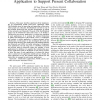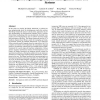321 search results - page 58 / 65 » A User Level Framework for Ad Hoc Routing |
TSMC
1998
13 years 7 months ago
1998
— The complexity of a design process or a design artifact substantially influences their performance. When evaluation of terms such as “design complexity” and its “quality...
COLCOM
2007
IEEE
14 years 1 months ago
2007
IEEE
Abstract—This paper describes experiences from implementing an experimental mobile peer-to-peer application called Peer2Schedule aimed at improving and supporting collaboration w...
WINET
2010
13 years 5 months ago
2010
Abstract Algorithms for scheduling TDMA transmissions in multi-hop networks usually determine the smallest length conflict-free assignment of slots in which each link or node is a...
ASPLOS
2008
ACM
13 years 9 months ago
2008
ACM
In this paper we propose the Merge framework, a general purpose programming model for heterogeneous multi-core systems. The Merge framework replaces current ad hoc approaches to p...
WOA
2003
13 years 8 months ago
2003
— Mobile Agents model is widely accepted as a good solution to simplify the coordination in a complex and distributed environment. Pervasive computing, presents many issues regar...


